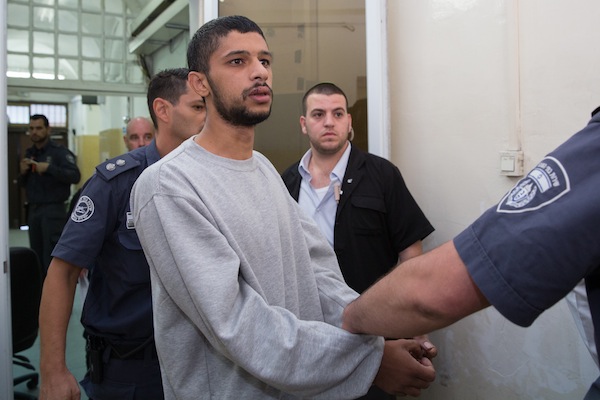A Jerusalem court rejects police attempt to place the blame for their own bullets elsewhere, but it’s not the first time they’ve tried — or succeeded at doing so.
By John Brown*

On the night between Sunday and Monday of last week, Israeli Border Police officers shot and killed Mustafa Nimer, a resident of Ramat Gan, in Jerusalem’s Shuafat refugee camp. While the police officers initially claimed that the driver, Ali Nimr — Mustafa’s cousin — had tried to attack them, a video of the shooting that surfaced on Tuesday revealed that the officers continued to fire even after the vehicle came to a complete stop and posed no threat. The police admit that Nimr did not attempt to carry out a car-ramming attack, raising questions over why they opened fire in the first place.
Another video that came to light on Wednesday raises suspicions that not only did the gunfire take place after the officers took control of the vehicle, but that one of the officers shot one of the passengers from close range.
The deceased’s fiancee, who was driving behind him in a separate car as they headed out to buy pizza, says that some of the bullets hit other vehicles, and that the shooting ceased only after she yelled at them that she was Jewish. The officers removed her from the scene; according to her one of the border cops even told said, “get her out of here, she cares about that Arab dog.”
On Wednesday the police claimed in a press release that Ali, not the officers, was responsible for his cousin’s death, since he drove recklessly and is suspected of having been under the influence of alcohol. It is clear that this is a baseless claim: the driver did not have have the ability to foresee that driving recklessly would end in gunfire, and he certainly did not foresee Border Police officers firing at his car after he had stopped. On Thursday the Jerusalem Magistrate’s Court rejected the police’s allegation that his driving somehow made him responsible for Nimr’s death.
So why is the driver being blamed?
Plea bargains and lies
A possible answer can be found in the case of Hassan a-Tabr, who was killed by an Israeli police officer on July 29, 2012. On that same night 14 Palestinian laborers were traveling in a vehicle driven by Hamada Jaber, a resident of Jerusalem, as they tried to enter Israel without work permits. According to the case file at the Department of Internal Police Investigations, as well as an investigation by Israeli human rights group B’Tselem, the officer who saw the vehicle on the way to the checkpoint warned the officers up ahead that a vehicle full of undocumented Palestinians was approaching.
Jaber stopped just before the checkpoint, and when the cops approached the vehicle he began driving quickly. The other officers called on the driver to stop, yet he continued to drive on. The car didn’t go through the checkpoint, however, and instead turned right and drove toward the Palestinian village of a-Zaim, inside the occupied territories. The officers at the checkpoint opened fire after the vehicle had ceased posing a threat to them — as is clear in a video published by B’Tselem (below). The officers later explained their behavior claiming they felt their life was in danger. Three of the passengers were hit, including a-Tabr, who was killed by a bullet to the back of his head. One police officer was hit by friendly fire.
WATCH: Officers open fire on Jaber’s vehicle
Jaber was indicted for manslaughter two weeks later. The investigation against the officers was closed due to “lack of evidence,” despite the fact that they opened fire against regulations. The Department of Internal Police Investigations did not bother to analyze the bullets after they were removed from the bodies in order to check which of the officers shot them.
The officers claimed that the driver attempted to run over Officer A., who managed to survive only because he managed to jump out of the way. This, they argued, led them to believe their lives were in danger, which led to them opening fire. However in his testimony, A. claimed that he never jumped, and the driver was the one who turned so as not to hit him.
Not only was this fundamental contradiction not investigated, it even appeared in Jaber’s indictment. Jaber ended up signing a plea bargain in which he admitted to causing grave injury, and was sentenced to three and a half years in prison. According to the plea bargain, Jaber was not allowed to contradict the details of the incident as they were presented in the new indictment sheet, including the accusation that he tried to ram the officers. Thus, in order to minimize his sentence, the driver was resigned to admit that he attempted to harm Officer A., which partially absolved the officers — this despite the fact that A. himself admitted this was not true.
The officers, just as they likely did in Nimr’s killing this week, opened fire and killed an innocent man despite him posing no threat. The only person who was left to blame was the driver. Even if the driver was not completely innocent, the responsibility lies with those who unnecessarily used deadly force. Time after time we see that they are not the ones who ultimately pay the price.
*John Brown is the pseudonym of an Israeli academic and a blogger. This story first appeared in Hebrew on Local Call, where he is a blogger. Read it here.

